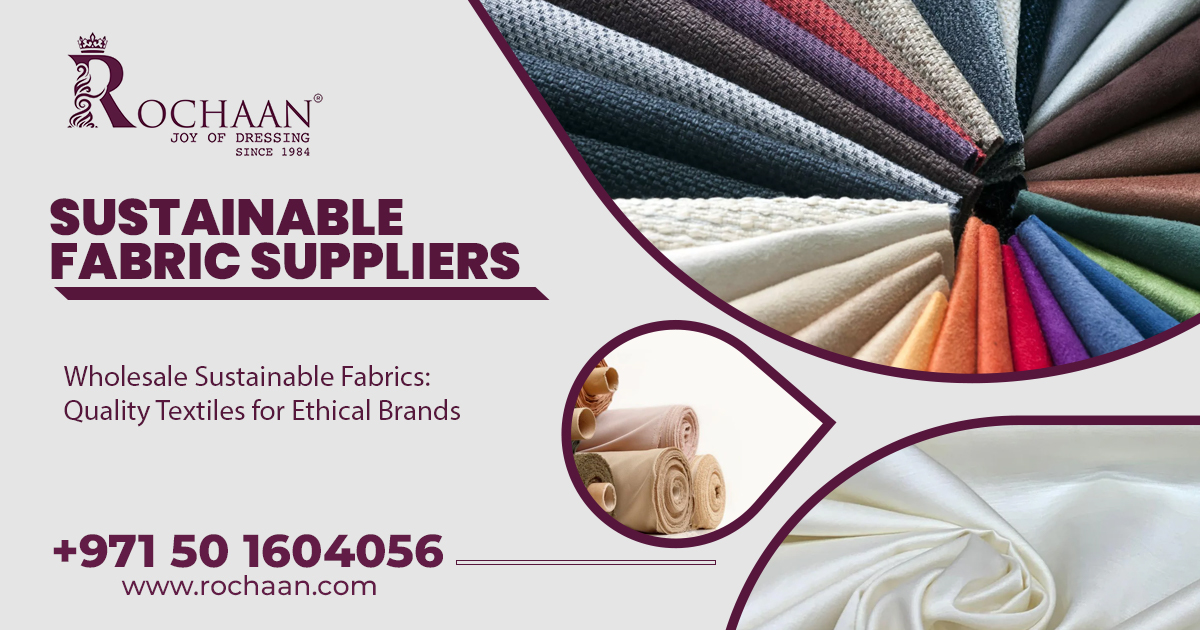Where the ill effects of the fashion industry on the environment start surfacing, we have to shift towards eco-friendly and sustainable fabrics. These high-tech materials are required to reduce the carbon footprint linked with cloth production while advancing ethical and sustainable Fabric supply chain practices. Due to its long-standing fabric extraction, India will start to take the lead in this movement. Other sources, especially from India, offer fabrics with a sustainable aspect that brings social benefits from hand-made fabric and organic cotton to bamboo fabrics.

Let us take you through the top new-age fabrics for Ethical Choice
They support a more ethical and ecological fashion business worldwide by emphasizing fair work practices and natural resources.
The Importance of Sustainable Fabric Suppliers
Sustainable fabric suppliers are key to decreasing the fashion industry’s carbon release. These providers concentrate on environmentally friendly materials and procedures that reduce waste, lower energy use, and lessen water consumption. Rather than the usual processes that can include harmful chemicals and non-renewable resources used to create material. A sustainable fabric is made from renewable resources using practices that do not harm the environment through pollution.
By choosing suppliers with sustainable practices, brands can guarantee that their products fit within the principles of a sustainability-aware customer. They are typically biodegradable, adding to neither landfill waste nor ocean pollution. Sourcing from sustainable fabric suppliers can address a small brand and an entire large fashion house towards a greener future.
Types of Sustainable Fabrics Available
Organic Cotton: Produced without the use of dangerous chemicals.
- Hemp: Hardy and low-water-requirement plants.
- Bamboo: Naturally soft, it grows quickly and is environmentally benign.
- Tencel: biodegradable fabric made from wood pulp supplied sustainably.
- Cork fabric is ecological and renewable, derived from cork trees.
The Ethical Side of Sustainable Fabrics
Sustainable fabric providers operate with ethical standards at their core, even above environmental sustainability. Sustainable suppliers collaborate closely with farmers and artisans to guarantee fair compensation and secure working conditions. By selecting ethical suppliers, brands can help local communities and promote a more just and equitable fashion industry.
Transparency is a powerful tool in the production of ethical fabrics. Suppliers of sustainable fabrics, often more open about their sourcing and production procedures, empower companies and customers to make informed and wise choices.
How Sustainable Fabrics Benefit Your Brand
Eco-friendly material use will benefit the environment and a brand’s reputation. As consumers grow aware of what impacts the environment through purchases, most choose sustainable brands. Applying eco-friendly materials to your products may distinguish them from similar products and attract the environmentally conscious consumer.
Additionally, regarding comfort, style, and quality, eco-friendly textiles are not different from conventional materials. The advent of modern technology has made eco-friendly materials as resistant and versatile as traditional ones.Companies can now become green without sacrificing performance or appearance. Suppliers of sustainable fabrics offer a vast array of choices, enabling designers to produce elegant, premium clothing consistent with their naturally conscious principles.
Sustinable Fabrics in Fashion.
It is through sustainable fabric manufacturers that the effort to make sustainable fashion in the future can start. The method of producing clothes through innovative and ethical means must be what the fashion industry needs to get used to, following the growing demand by customers. Besides meeting the needs of its customers, the industry can also shape a more ethical and conscious fashion industry by producing products that are not only human-friendly but also not unfriendly to the earth.
Conclusion
It pays well, both morally and financially, to source fabrics from environment-friendly fabric suppliers. Most sustainable materials help achieve such benefits as reducing.
FAQs
The fashion industry is interested in sustainable fabrics; what are exactly sustainable fabrics?
Sustainable textiles, produced from renewable resources and sourced under sustainably obtained materials, testify to the fashion industry’s society’s commitment toward ethical sourcing. It shrinks the carbon footprint of the fashion sector by reducing pollution, waste, and energy use. The use through fair labor methods along with biodegradability helps achieve ethics in sourcing and impacts the environment positively. This focuses on ethical sourcing, which is a good sign that the fashion industry is going toward a more moral and ecologically conscious future.
Which companies make what kinds of sustainable clothing?
Sustainable fabric vendors have many eco-friendly alternatives, such as recycled materials. Every type of fabric will help the environment. For example, organic cotton is grown free from hazardous pesticides and has fewer water requirements to flourish. So, the environmental impact of recycled fabrics is reduced because these are recycling waste materials while still maintaining excellent quality and durability.
What benefit does buying sustainable fabrics have for my brand?
In sustainable textiles, investment reduces your products’ environmental impacts while developing your company’s brand. Sustainable products will attract environmentally conscious clients who increasingly look for companies sharing their interests. Also, state-of-the-art sustainable textiles are just as fashionable and better than traditional ones, enabling you to respect performance, design criteria, and ethical expectations.
